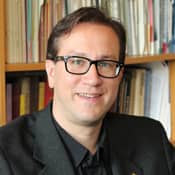Eric Weiner's recent wishy-washier-than-thou New York Times article, "Americans: Undecided About God?", presents a curious new bias to decipher when it comes to religion and nonbelievers.
Weiner walks in well-worn shoes when he tries to tackle a cultural issue by opening with a complaint and offering a possibly better path. He says we are terrible when it comes to talking about god and asks for a new "religious operating system." But he's sadly lacking in clarity and hopelessly striving for impossibility.
We don't really know where Weiner stands, as the title aptly states he is undecided about God. He may not be alone in this position, but he significantly exaggerates how much company he has in the United States when he implies most of the "Nones" are with him. Nones are people who simply answer "none" when asked for religious affiliation, and that doesn't indicate that they are undecided about whether or not they believe in a god.
Weiner counts himself among this None group, but tries to separate it from nonbelievers, claiming that "we Nones may not believe in God, but we hope to one day." As enigmatic as it is to hope to believe in something you don't, he also misunderstands a widely quoted study when he claims that only 7 percent of Nones are atheists. What Weiner and so many others fail to recognize is that there are many terms Nones use to describe themselves, including atheist, humanist, freethinker, skeptic, non-theist, nonbeliever, secular, and agnostic, to name the most common. Additionally, according to the 2008 U.S. Religious Landscape Survey done by the Pew Forum on Religion and Public Life there are millions of Americans who actually identify with a particular religion for cultural, familial, or community reasons but remain nonbelievers. Most Nones and many of those that are religiously labeled don't hold a belief in a traditional god, so to claim that atheists are a tiny minority or to assume that they have an unfulfilled desire to become a believer is simply not true.
Weiner tries to make the case that there would be fewer Nones if only politics would release its hold on religion, implying that Nones exist because politics and religion have become too closely intertwined. While this unfortunate entanglement between church and state is real, the insistence that Nones would jump at the chance to join a religion if politics would disappear from the picture is a false assertion that prejudicially assumes that nonbelievers aren't sincere in their convictions. Millions of nonbelievers have spent years reading, discussing, and thinking about the religions of our culture and have specifically decided that their explanations just don't make sense.
In seeking a solution to the so-called Angry Atheist/ True Believer dichotomy Weiner uses, he seems to want a social framework that will maintain religiosity while still supporting doubt. That may be nice in theory, but doubt is not something religions are built to embrace. Religion replaces doubt with faith&mash;the acceptance of doctrine, often even in the light of contradictory evidence. Faith isn't possible for those who doubt, experiment, and accept the facts presented when religious claims are honestly tested. Weiner is therefore asking for the impossible when he challenges us to imagine a forum where faith and doubt co-exist harmoniously.
It's obvious that Weiner is conflicted. Perhaps driven by a laudable desire to achieve harmony, he is trying to find a way to hold on to supernaturalism in a purely natural world, but there simply is no "religious space that celebrates doubt, encourages experimentation and allows one to utter the word God without embarrassment." Such ideas are mutually exclusive. The "new way of being religious" that Weiner is seeking is understandable, given the complaints and observations that cause his inner conflicts. He could certainly try to create something that is "straightforward and unencumbered and absolutely intuitive," but it wouldn't be a religion. It would be exactly the opposite.
12/20/2011 5:00:00 AM





